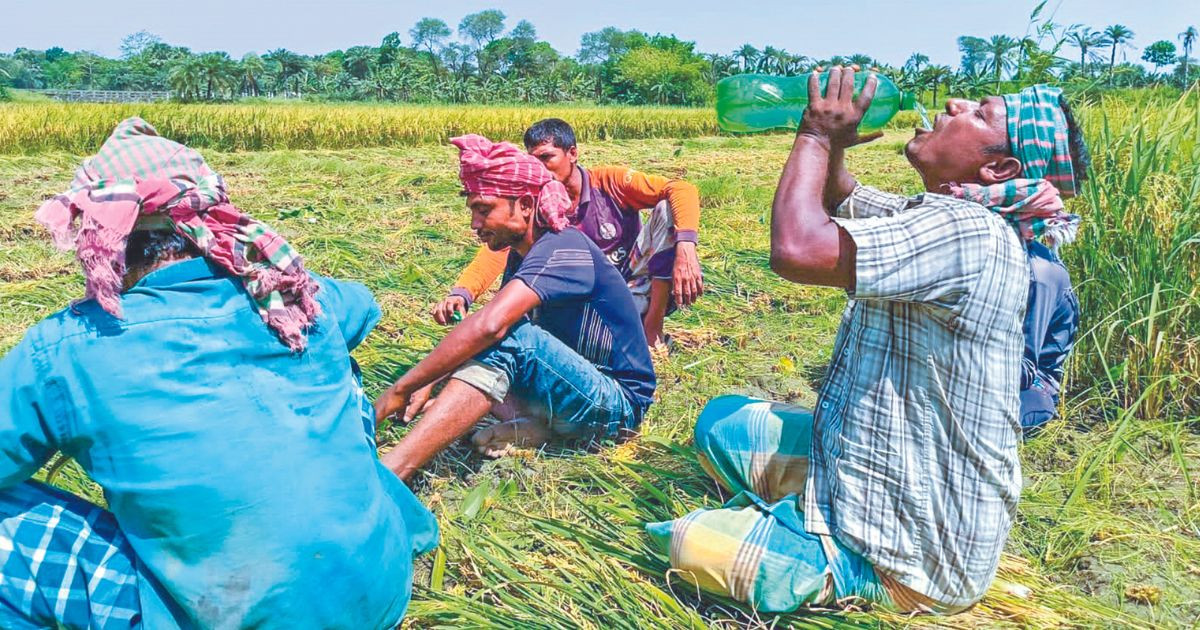Crops wither, eggs drop: Heatwave inflicts Tk3,000cr loss in 4 SW districts
The districts are Chuadanga, Meherpur, Jhenaidah, and Kushtia, while Chuadanga is the worst affected district
Amanur Aman, Kushtia
Published: 28 Jun 2024

The prolonged heatwave lasting about 50 days has inflicted severe damage on agriculture, fisheries, and animal resources in four southwestern districts of the country and caused a staggering Tk3,000 crore loss across these sectors.
The districts are Chuadanga, Meherpur, Jhenaidah, and Kushtia, while Chuadanga is the worst affected district, reveals a study conducted by the WAVE Foundation, a non-governmental organisation.
According to the survey, the districts have experienced 37 consecutive days of heatwave this year since the beginning of the month of April.
The highest temperature of 43.7 degrees Celsius was recorded in Chuadanga. At the same time, temperatures above 36 degrees Celsius were also recorded in the districts on about 11 days in March.
There was no rainfall during this time. The situation caused a drought in these districts, and as a result, the groundwater level in the districts was very low.
The study shows that a total of 1,80,811 hectares of boro paddy were cultivated in these four districts, with a production target of 10,84,866 tonnes.
But the yield has dropped by 2 maunds per bigha in the current season due to the non-feeding of rice grains and premature ripening.
As a result, rice production has fallen by 1,08,052 tonnes, and accordingly, income has decreased by Tk270,13,16,340 due to a decrease in production.
On the other hand, Boro paddy requires additional irrigation due to the heat and lack of rain throughout the season, and this has increased production costs by Tk1,500 per bigha on average.
Maize, another cash crop in the districts, produced less due to a low grain count and malnutrition. Maize yields fell by an average of 6 maunds per bigha.
The survey also shows that dragon fruit production will decline by about 4,127 tonnes, litchi production will decline to about 4,644 tonnes, and mango production revenues will drop by about 40% due to the heatwave.
Similarly, egg production fell by an average of 22.5% in 4 districts during April–May '24, amounting to a loss of about Tk37,84,50,000.
Officials, employees of the Agriculture Department of the four districts, workers of non-government organisations, journalists, representatives of civil society, day labourers, rickshaw pullers, transport workers, agricultural workers, fishermen, small traders, and people from the small employment class were covered under the survey.
Chuadanga Agricultural Extension Department (DAE) deputy director Bivas Chandra Saha said the heat wave has caused additional irrigation costs.
He said they are sending information to the higher authorities to take timely steps by selecting drought-resistant crop varieties.
Key researcher of the WAVE Foundation Dr Hasan Ali shared the data during a press conference recently.
Dr Hasan Ali said these districts in the southwestern region should be taken into consideration as areas prone to heat waves, and strategic plans should be ensured.
He said that, first and foremost, sector-wise separate allocations should be ensured for faster rehabilitation of individuals or families, and ultimately, changes should be made in the lifestyle of the people.

